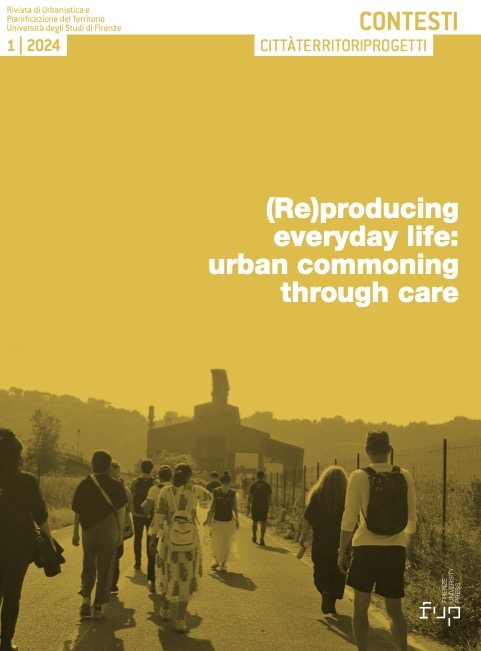An instituting-organisational framework for the interpretation of urban commoning. Lessons from a neighbourhood park
Published 2024-11-25
Keywords
- organisation,
- institutions,
- engaged research,
- public spaces,
- collective learning
How to Cite
Copyright (c) 2024 Giusy Pappalardo, Laura Saija

This work is licensed under a Creative Commons Attribution-NonCommercial 4.0 International License.
Abstract
Drawing on critical scholarship on commoning processes, this article aims to contribute to the debate by reflecting on an argumentative case that took place in a neighbourhood public park on the northern outskirts of the city of Catania in Italy. Based on our direct engagement in such a process, we discuss the rise and fall of this ‘commoning attempt’, with the aim of reflecting on the possibilities and the pitfalls associated with the collective effort to take care of a neglected space. The case is discussed using a theoretical framework developed intersecting Argyris' theory of organisational learning and Esposito’s ‘instituting thought’ applied to urban planning. Through the narrative of the main stages of a nine-month process, using a variety of sources of evidence – our field notes, archival materials, etc. –, we discuss some key elements to contribute to the advancement of the disciplinary debate on the possibilities opened by the instituting-organisational approach.
Downloads
References
- Argyris C. 1986, Reinforcing organizational defensive routines: An unintended human resources activity, «Human Resource Management», 25(4), pp. 541-555
- Argyris C. 1995, Action science and organizational learning, «Journal of managerial psychology», 10(6), pp. 20-26
- Argyris C. 2003, A life full of learning, «Organization Studies», 24(7), pp. 1178-1192
- Arvanitidis P. A., Papagiannitsis G. 2020, Urban open spaces as a commons: The credibility thesis and common property in a self-governed park of Athens, Greece, «Cities», 97, p. 102480.
- Baioni M., Basso S., Caudo G., Franzese A., Marchigiani E., Munarin S., ... & Vazzoler N. 2021, Diritti in città: Gli standard urbanistici in Italia dal 1968 a oggi, Donzelli, Roma
- Care Collective. 2020, The Care Manifesto: The Politics of Interdependence, Verso Books
- Ciaffi D. 2019, Sharing the Commons as a 'New Top' of Arnstein's Ladder of Participation. «Built environment», 45(2), pp. 162-172
- Chiarenza C. 2018, San Nullo - Memorie e Sogni di un quartiere incompiuto, unpublished Master Thesis, Università di Catania
- Esposito R. 2020, Pensiero istituente: Tre paradigmi di ontologia politica, Einaudi, Torino
- Esposito R. 2021, Istituzione, Il Mulino, Bologna
- Grazzini F., Bordi L. 2024, Più grigio che verde. Dieci anni di lotta per il bosco la Goccia di Bovisa, Youcanprint
- Hardin G. 1968, The tragedy of the commons: the population problem has no technical solution; it requires a fundamental extension in morality, «Science», 162(3859), pp. 1243-1248
- Jeffrey A., McFarlane C., & Vasudevan A. 2012, Rethinking enclosure: Space, subjectivity and the commons, «Antipode», 44(4), pp. 1247-1267
- Li Destri Nicosia G., & Saija L. 2023 Planning as an instituting process. Overcoming Agamben’s despair using Esposito’s political ontology, «Planning Theory», 14730952231209755
- Mitrašinović M., & Mehta V., Eds., 2021, Public space reader, Routledg
- Ostrom E. 1990, Governing the commons: The evolution of institutions for collective action. Cambridge University Press
- Partelow S., & Manlosa A. O. 2023,. Commoning the governance: a review of literature and the integration of power, «Sustainability Science», 18(1), pp. 265-283
- Piazza R., Gravagno F., & Pappalardo G. 2018, Learning to become a community: Mafia landscapes Lab, «eJournal of University Lifelong Learning», 2(1), pp. 79-84.
- Quintana A., & Campbell L. M. 2019, Critical commons scholarship: A typology, «International Journal of the Commons», 13(2)
- Saija L. 2014, Writing about engaged scholarship: Misunderstandings and the meaning of “quality” in action research publications, «Planning Theory & Practice», 15(2), pp. 187-201
- Saija L., Pappalardo G. 2022, An argument for action research-inspired participatory mapping, «Journal of Planning Education and Research», 42(3), pp. 375-385
- Saija L., Li Destri Nicosia G., Barbanti C., forthcoming, An organizational approach to citizen engagement for social cohesion: the gardening experience in an Italian Public Housing neighborhood, in F. Othengrafen, S. Herrmann, D. Pencic, S. Lazarevski, Eds., Social Cohesion and Resilience through Citizen Engagement: A Place-based Approach, Edward Elgar.
- Stavrides S. 2019, Common spaces of urban emancipation, Manchester University Press
- Sreetheran M., & Van Den Bosch C. C. K. 2014, A socio-ecological exploration of fear of crime in urban green spaces–A systematic review, «Urban Forestry & Urban Greening», 13(1), pp. 1-18
- Tedesco C. 2023, Overcoming an impasse or innovating urban policy? The role of social activism within conflictual urban regeneration processes in Southern Italy, «Planning Practice & Research», pp. 1-19
- Varvarousis A. 2020, The rhizomatic expansion of commoning through social movements, «Ecological Economics», 171, pp. 106596
- Velicu I., & García-López G. 2018, Thinking the commons through Ostrom and Butler: Boundedness and vulnerability, «Theory, Culture & Society», 35(6), pp. 55-73
- Viderman T., Knierbein S., Kränzl E., Frank S., Roskamm N., & Wall E. 2023, Unsettled Urban Space: Routines, Temporalities and Contestations, Taylor & Francis
- Vitale E. 2013, Contro i beni comuni: Una critica illuminista, Laterza
- Vittoria M. P., Ragozino S., & Esposito De Vita G. 2023, Urban Commons between Ostrom’s and Neo-Materialist Approaches: The Case of Lido Pola in Naples, Southern Italy, «Land» 12(3), p. 524

